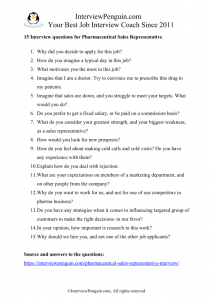Pharmaceutical business generates more than one trillion dollars in revenues each year, worldwide. So why not to grab your small part of this juicy pie? Let’s put things in perspective first: All medications have side effects. 80% of all drugs sold worldwide do not address the cause of the medical issue. They just treat (suppress) the symptoms.
In no way do I support the culture of prescribing drugs for everything and everyone. However, the numbers are clear: People want drugs, more drugs are prescribed and sold in the world each year, and the trend likely won’t change. And companies compete for customers–just like in any other business. Excellent sales representatives are highly valued in each pharma company, and you can make a killing (up to $100,000 annually) having this job.
So if your conscience doesn’t whisper to you that you should decline your interview (and look for some other job in sales instead), I’ll show you what questions they will ask you in your pharma sales rep interview, and how to deal with them. Enjoy!
Table of Contents
Why did you decide to apply for this job?
You can say that you excel in sales, that you have good connections in the circles of doctors and pharmacists, or that you basically enjoy working with medical professionals and get along with them easily.
You can also say that you really like the principal drug/product of your prospective employer, that you take it yourself (or someone you know takes it), and believe in the healing effects (or at least some competitive advantage when compared with the products offered by other companies) and therefor you’d find it easy to sell it. One way or another, they should feel that you aren’t in only for a big salary, or because you do not know what else to do with your live and excellent sales skills.
How do you imagine a typical day in this job?
The key is to show proactive approach to work. Say that you imagine spending most of your days on the road, approaching doctors, meeting them, trying to start new business relationships, as well as selling to existing customers. Direct visits are your best bet, but you can also say that you plan to try cold calling, and other techniques, to find new customers.
Of course, you’ll spend some time also in your office, learning about new drugs, planning your sales trips, and doing some administrative work, such as reporting and submitting orders, but that isn’t the important part of a job.
* May also interest you: Retail sales associate interview questions.
What motivates you the most in this job?
Now you wouldn’t achieve much with empty phrases, such as that you want to help people. Because drugs rarely help anyone in a long run.
Saying that you enjoy the process of selling medical stuff, or spending your time on the road, begging the physicians and other medical professionals to give you ten minutes of their time, won’t sound very convincing either. Because nobody really likes this sort of work. All that remains is being honest.
Say that you understand the huge market potential, and that not many sales jobs offer such opportunities like this one. Here you can earn really big, even without any qualification or previous working experience. Another alternative is referring to your loved ones (for example if you have kids), saying that you want to provide for them, that you want them to have a good life, and that this job (the earning potential it has) is a means of doing it.
Imagine that I am a doctor. Try to convince me to prescribe this drug to my patients.
A simple role play is a best way of assessing your true level of sales skills. And also your true understanding of this profession. Now, convincing any medical professional to change their supplier is no easy task. Because more often than not, the two drugs will be comparable, offering similar benefits to final customer, or offering no real benefits at all…
Of course it can happen that you sell something special–a new invention or a revolutionary drug, and then it makes sense to explain the competitive advantage. But you’ll be lucky to experience this particular situation in your work.
Doctors know it very well. But just like almost everyone else, they care mostly for their own gain. What will they gain from switching suppliers? What can you offer for “making a right decision”? Holiday vouchers, place in a consulting panel, or speaking assignment at a conference (with a hefty compensation), are some of the things you can typically offer. But it’s not only about money.
You can also offer some products for free (such as medical equipment or product samples) with every order they make. You can offer better supply, marketing support, and anything else that will help them sell more and satisfy their clients.
And of course, participating on the profit (getting their share from every sale they make) is also an effective strategy. Try to use any of them in your role play. And do not forget to keep an eye contact, to ask questions, and to do anything else you’d do in a good sales talk…
Special Tip: You can also download the full list of questions in a one page long .PDF, print it, and practice your interview answers anytime later:

Imagine that sales are down, and you struggle to meet your targets. What would you do?
Long series of rejections, and days when you neither sell anything nor manage to meet any doctor in person, belong to this job. It is one of the reasons for high fluctuation rate in the field, and your interviewers try to find out whether you’ll also quit with the first crisis. Or whether they’ll have to fire you since you won’t meet your goals repeatedly.
Ensure them that you understand that setbacks and low periods belong to the job. And that you count with them, and understand that every NO you hear in the meetings with the physicians moves you closer to another deal. And every bad meetings helps you to prepare for the next one, and do better next time.
So, you would do nothing special. You would maybe try different sales pitches and strategies, but you would continue as usually, visiting medical practices and trying your best to close the deals.
Do you prefer to get a fixed salary, or be paid on a commission basis?
Best salesmen prefer commission basis. But you are likely just starting, unsure about your future success, and it would be risky to be paid solely on commission basis.
Say that you prefer a combination of the two–a basic salary, something like a plateau that will keep your head above the water during low periods, and of course a commission from every sales you make–because you plan to make BIG sales for your employer…
Other questions you may face in your pharmaceutical sales job interview
- What do you consider your greatest strength, and your biggest weakness, as a sales representative?
- How would you look for new prospects?
- Tell us about an obstacle you overcame.
- Why do you want to work in sales?
- How do you feel about making cold calls and cold visits? Do you have any experience with them?
- Explain how do you deal with rejection.
- What are your expectations on members of a marketing department, and on other people from the company?
- Why do you want to work for us, and not for one of our competitors in pharma business?
- Do you have any strategies when it comes to influencing targeted group of of customers to make the right decisions–in our favor?
- In your opinion, how important is research in this work?
- Sell me this pen (or other object the interviewers show you).
- Describe a time when you used persuasion to successfully convince someone.
- Why should we hire you, and not one of the other job applicants?
Conclusion, premium interview answers
Interview for a job of a pharma sales representative belongs to job interviews with average difficulty. Perhaps the most tricky part is a short role play, an exercise that will test your sales skills directly. But you may also face some tricky scenario-based questions.
The good news is that you won’t compete with many people for the job–up to five candidates typically. That makes it easier to succeed, at least when we compare it to some managerial job interviews and competing against dozens of other job seekers.
Prepare for the questions, practice your interview answers and a role play (with a friend or with an interview coach), and do some research about your next employer. And if you want to make sure that you will outclass your competitors, and be ready for each tricky role play and scenario-based question they may throw at you in this interview, consider purchasing our Interview Success Package. Up to 10 premium answers to all tricky scenario based questions will help you streamline your interview preparation, and outclass other job candidates. Thank you for checking it out, and I wish you best of luck in your interview!
Matthew
May also interest you:
- Pharmacy Manager interview questions.
- Territory Sales Manager interview questions.
- Customer Relationship Manager interview questions.


